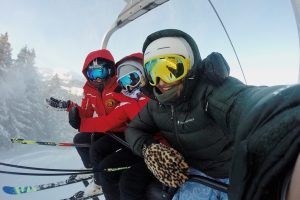Prevent injury this ski season
 With winter fast upon us and snow falling in the mountains, here are some facts I tell my patients about common skiing and snowboarding injuries, tips on recognizing them and, most importantly, how to use common sense to minimize your risk of getting injured.
With winter fast upon us and snow falling in the mountains, here are some facts I tell my patients about common skiing and snowboarding injuries, tips on recognizing them and, most importantly, how to use common sense to minimize your risk of getting injured.
Concussions
Head injuries remain one of the most common injuries of skiing and snowboarding. While wearing a helmet can help to minimize risk and reduce the number of minor head injuries like scalp lacerations, helmets do not prevent more serious injuries such as concussions and traumatic brain injuries.
A concussion is a process affecting the brain after a traumatic blow to the head or the body that transmits force to the head. On the ski slopes, this can be due to falls or crashes with other skiers, trees, chairlift poles or rocks. Some of the warning signs of concussions include headache, amnesia, unusual fatigue, slurred speech or nausea.
If you suspect a person has a concussion, it is important to ensure that a responsible adult is with the concussed skier for at least 24 hours after the event to monitor for any worsening. Symptoms for serious head injuries that warrant emergency care include loss of consciousness for more than a minute, repeat vomiting, persistent confusion or a worsening headache.
Any child or adult who sustains a concussion should not go out on the slopes again, as they are more likely to get re-injured. It is a good idea to see a doctor within one to two days after a concussion, even if emergency care is not required.
Other injuries
In addition to head injuries, skiers should be aware of these other common injuries:
- Knee damage to the medial collateral ligament (MCL), which occurs with slow, twisting falls or when beginners maintain a snowplow position for lengthy periods and stress the ligament;
- Knee injury when the anterior cruciate ligament (ACL) is ruptured, which can be caused by the lower leg suddenly twisting away for the upper leg, as in “catching an edge”;
- Fractures of both the femur and tibia occur more commonly with hard, twisting falls or collisions;
- Injury to the thumb, which occurs when a skier falls on an outstretched arm that is still gripping the pole; and
- Shoulder dislocations from a fall or collision.
For minor knee injuries, I recommend rest, icing and reassessing the knee in a few days. A more serious knee injury requiring immediate attention will be quite obvious: lack of ability to walk or bear weight, massive pain or swelling.
With any injury, if you are unsure if immediate medical attention is needed, call your local health-care provider or visit an emergency room to be sure.
Good conditioning, equipment
Although injuries can occur while skiing and snowboarding, the more physically conditioned you are and the more you are aware of scenarios that lead to crashes, the safer you should be. Attention to preseason conditioning with an emphasis on sport-specific exercises will help delay muscle fatigue, which often contributes to an injury.
I recommend trying the following exercises for at least 30 minutes four times a week for a month before hitting the slopes:
- Core conditioning — Abdominal and core workouts;
- Lower body — Focus on strength, endurance and plyometrics (muscular power and explosiveness) of quadriceps, gluteus and hamstrings;
- Balance training — Yoga poses and single-leg exercises support balance; and
- Upper-extremity conditioning — Pushups are a great exercise when done correctly.
You can find these types of exercises in ski-conditioning classes, books or online, or make an appointment with a physical therapist or a fitness trainer who can show you.
In addition to conditioning, good equipment that is properly fitted and maintained by a certified ski shop will help minimize risks. Taking lessons can also help skiers improve technique and better understand ski conditions. Skiers and riders who understand the risks and attempt to control as many variables as possible can avoid many serious injuries.
So whether you are a novice or seasoned mountain ripper, pay attention to your surroundings and have a blast. Let it snow!



